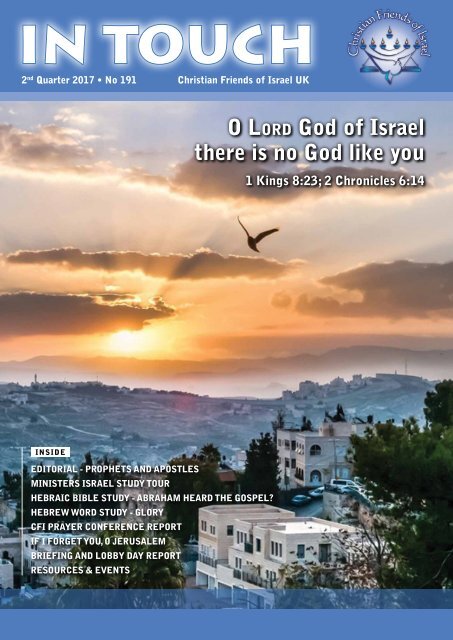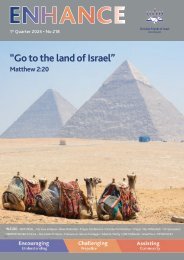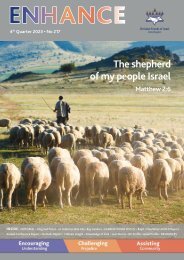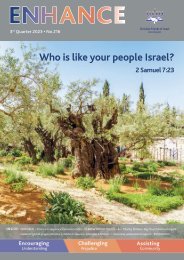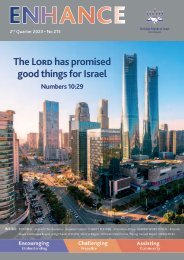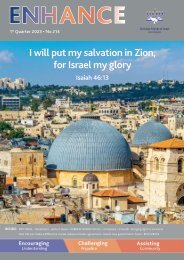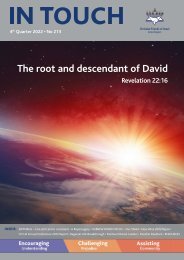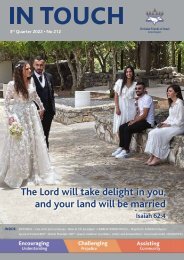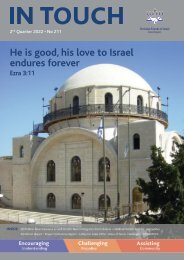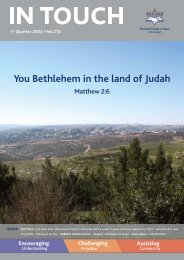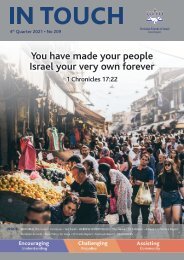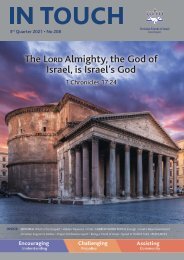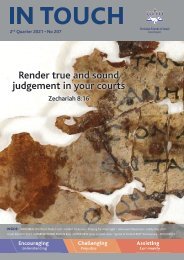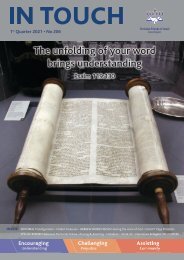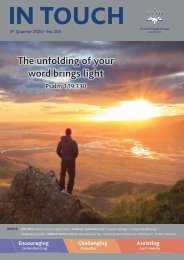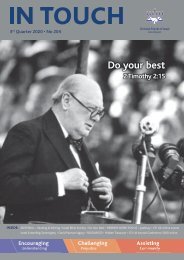You also want an ePaper? Increase the reach of your titles
YUMPU automatically turns print PDFs into web optimized ePapers that Google loves.
2 nd <strong>Quarter</strong> <strong>2017</strong> • No 191 Christian Friends of Israel UK<br />
O Lord God of Israel<br />
there is no God like you<br />
1 Kings 8:23; 2 Chronicles 6:14<br />
INSIDE<br />
EDITORIAL - PROPHETS AND APOSTLES<br />
MINISTERS ISRAEL STUDY TOUR<br />
HEBRAIC BIBLE STUDY - ABRAHAM HEARD THE GOSPEL?<br />
HEBREW WORD STUDY - GLORY<br />
CFI PRAYER CONFERENCE REPORT<br />
IF I FORGET YOU, O JERUSALEM<br />
BRIEFING AND LOBBY DAY REPORT<br />
RESOURCES & EVENTS
Editorial<br />
About us<br />
CFI-UK seeks to bless Israel by<br />
means of practical and moral<br />
support, and to serve the Church in<br />
teaching about God’s purposes for<br />
Israel and the Hebraic heritage<br />
of our faith.<br />
CFI also produces a monthly Prayer<br />
Letter, an audio Middle East News<br />
Report and distributes the Haverim<br />
Hebraic teaching CDs.<br />
Please send for full details of<br />
projects in Israel and also of the<br />
many teaching resources available.<br />
As an educational charity,<br />
we carry a variety of<br />
resources relevant to our<br />
purpose. We do not<br />
necessarily endorse every<br />
view expressed by our<br />
guest writers or authors<br />
of these resources.<br />
Published by:<br />
CFI Charitable Trust<br />
PO Box 2687<br />
Eastbourne<br />
BN22 7LZ<br />
Tel: 01323 410 810<br />
Fax: 01323 410 211<br />
Email: info@cfi.org.uk<br />
Websites: www.cfi.org.uk<br />
www.keshercourse.org.uk<br />
facebook.com/cfiuk<br />
twitter.com/cfi_uk<br />
Registered Charity<br />
No. 1101899<br />
Registered Office c/o<br />
Caladine, Chantry House<br />
22 Upperton Road<br />
Eastbourne, BN21 1BF<br />
Company No: 0498515<br />
VAT Registration No: GB678780275<br />
Front Cover Image:<br />
View over Jerusalem<br />
2 IN TOUCH • 2 nd <strong>Quarter</strong> <strong>2017</strong><br />
Jacob Vince<br />
<strong>In</strong> previous editorials I have<br />
expressed my preference for<br />
referring to the four quarters of<br />
the Bible - Law, Prophets, Psalms<br />
and Apostles (see Luke 24:44 and<br />
Acts 2:42) – rather than the Old<br />
Testament and New Testament.<br />
Recently I discovered when the<br />
terms old and new were first used to<br />
categorise the collection of the books of<br />
the Bible, and also by whom. Believe<br />
it or not, it was Marcion who first<br />
used the terms in this way. He saw<br />
the God of what he referred to as the<br />
Old Testament as inferior to the God<br />
of the New Testament – an early form<br />
of replacement theology. <strong>In</strong> this he<br />
was roundly condemned as a heretic,<br />
to the credit of the Early Church<br />
Fathers. However it appears they<br />
retained Marcion’s categorisation of<br />
Old and New Testament, and indeed<br />
the Septuagint order of the books rather<br />
than the Hebrew order, which is the one<br />
Jews use right down to today and the<br />
one Jesus himself used in his day (Luke<br />
24:44).<br />
Following this four-quarter designation<br />
I want to focus on some words<br />
that the apostle Peter writes in his<br />
second and final recorded letter.<br />
Peter writes this:<br />
‘Dear friends, this is now my second<br />
letter to you. I have written both of them as<br />
reminders to stimulate you to wholesome<br />
thinking.’<br />
And this is the key sentence,<br />
‘I want you to recall the words spoken<br />
in the past by the holy prophets and the<br />
command given by our Lord and Saviour<br />
through your apostles’ (2 Peter 3:1-2).<br />
So here we have the commendation of<br />
the word spoken through the prophets<br />
alongside the word spoken through the<br />
apostles.<br />
I expect we know well the<br />
introduction to the letter understood<br />
as written to the Hebrews, where the<br />
writer states:<br />
‘<strong>In</strong> the past God spoke to our forefathers<br />
through the prophets at many times and in<br />
various ways, but in these last days he has<br />
Prophets<br />
and Apostles<br />
www.cfi.org.uk<br />
spoken to us by his Son’ (Hebrews 1:1-2)<br />
Some in the church would take this<br />
to mean that the words spoken by<br />
the prophets are no longer important<br />
because now he has spoken to us by his<br />
Son. However, the earlier extract from<br />
Peter’s second letter contradicts this<br />
approach. Peter wants his readers to<br />
recall the words spoken in the past by<br />
the holy prophets. Of course it makes<br />
sense when taking the Hebrews passage<br />
as our guide that God speaks by his Son,<br />
or to put it another way, that Jesus is<br />
God’s word in the flesh. However, Jesus<br />
himself refers constantly to the written<br />
word of the Scriptures, contained in<br />
the first three quarters of the Bible, and<br />
then entrusts its final quarter to his<br />
immediate apostles and also, in due<br />
course to the apostle Paul, to write and<br />
record their witness statement (Luke<br />
1:1-2) regarding ‘all that Jesus began to<br />
do and to teach’ (Acts 1:1). <strong>In</strong>deed, at<br />
the close of the Apostles’ section, in<br />
the Revelation of Jesus Christ, John<br />
was specifically requested to write this<br />
down. ‘Write, therefore, what you have<br />
seen, what is now and what will take place<br />
later’ (Revelation 1:19). So we see that<br />
the written word itself tells us about<br />
Jesus the living Word.<br />
As the apostle John writes toward<br />
the end of his first letter, ‘And this is the<br />
testimony God has given us, eternal life,<br />
and this life is in his Son … I write these<br />
things to you who believe in the name of<br />
the Son of God’ (1 John 5:11-12). These<br />
are indeed powerful written words,<br />
telling believers about the living Word.<br />
It is interesting that John calls this his<br />
testimony, which is a better word than<br />
testament. Either way, it is a written<br />
record of what has been seen by closeup<br />
eye witnesses, in the same way that<br />
the foreseers of old, the prophets, saw<br />
from afar what was to come. Both sets<br />
of records, or testimonies, are necessary<br />
and this is why the apostle Peter writes,<br />
‘I want you to recall the words spoken<br />
in the past by the holy prophets and the<br />
command given by our Lord and Saviour<br />
through your apostles’ (2 Peter 3:1-2).
Report<br />
Ministers’ Israel Study Tour <strong>2017</strong><br />
Revd Andrew Byfield<br />
Waking up with a view<br />
over the Mediterranean<br />
Sea took my breath<br />
away. I had seen this stretch of<br />
water at various points before<br />
(along the French and Italian<br />
coasts) but seeing its eastern-most<br />
shore in the Promised Land was<br />
surprisingly moving.<br />
I sat at my breakfast table and ran a<br />
Bible search on ‘Mediterranean Sea.’<br />
Up came the verse from the book<br />
of Joshua, ‘Your territory will extend<br />
from the desert to Lebanon, and from the<br />
great river, the Euphrates—all the Hittite<br />
country—to the Mediterranean Sea in the<br />
west.’ (Joshua 1:4). Now here it was in<br />
front of me.<br />
Later that first day we headed south<br />
to the Gaza border. Before leaving the<br />
UK I had visited the Foreign Office<br />
website. It expressly warned not to go<br />
near this spot! There were nerves as<br />
we stared into Gaza City, well within<br />
reach of Hamas rockets. It was worth<br />
it. Seeing the Israeli efforts to love their<br />
neighbour by sending tens of lorryloads<br />
of aid into the Gaza Strip every<br />
day was a stunning experience and<br />
one no western media outlet had ever<br />
told me about. Friends at home were<br />
equally surprised when I told them on<br />
my return.<br />
We spent the next night in Ramallah,<br />
another trouble spot I had been<br />
warned about by years of western<br />
press coverage. There we met an<br />
Anglican Vicar of the town. Over<br />
dinner I felt somewhat ashamed of<br />
my ignorance of the plight of Arab<br />
Christians. Combined with hearing<br />
the Palestinian Authorities’ take on<br />
the Arab-Israeli conflict earlier that<br />
day, it was all such a stark contrast to<br />
the narrative coming from those just<br />
a few miles away in Israeli territory.<br />
That tension has still not resolved itself<br />
in my mind months later. Perhaps it<br />
never will.<br />
Before we had time to process it<br />
we were off again, this time in search<br />
of the shores of Lake Galilee and the<br />
stunning remains of Capernaum.<br />
Gazing into Simon Peter’s house and<br />
the synagogue where Jesus cast out a<br />
demon suddenly brought the gospel<br />
accounts into sharp focus for me.<br />
That experience was to be repeated<br />
again and again throughout the next<br />
few days as we took the journey south<br />
to Jerusalem. Over lunch in Galilee<br />
our tour guide happened to mention<br />
something I had never heard of before,<br />
‘Jerusalem Syndrome’. Apparently<br />
medics recognise it as a genuine<br />
condition. So overwhelmed with<br />
emotion and deep connection to their<br />
religious roots are visitors to the great<br />
city that they struggle to cope. There<br />
is apparently to this day in Jerusalem<br />
a wing in the hospital laid aside for<br />
sufferers.<br />
It seemed laughable at the time,<br />
but later in the week seeing the place<br />
with my own eyes I could vaguely<br />
understand why it happens. Seeing the<br />
magnificence of the Temple complex.<br />
Walking the Palm Sunday route down<br />
Ministers’ Israel Study Tour <strong>2017</strong> at Shiloh<br />
the Mount of Olives from Bethany.<br />
Staring into the Garden of Gethsemane<br />
where the Lord chose to go to the cross<br />
for me. Visiting Skull Hill and the<br />
Garden Tomb. It was hard to come<br />
away from all these places without<br />
being deeply moved and affected for<br />
many weeks to come.<br />
For me, though, it was the tiny stone<br />
crypt a few days later in Bethlehem,<br />
said to be the location of the Christmas<br />
manger, that left the deepest<br />
impression. I had expected nothing<br />
more than a tourist trap, a place full<br />
of cheap souvenirs. Combined with<br />
not being one given to strong emotion<br />
my expectations were low. However,<br />
entering that little chamber I was<br />
overcome with a profound sense of the<br />
presence of God. Hard to fathom that<br />
here was the place the Word became<br />
flesh and made his dwelling among us.<br />
On the way home we visited the<br />
Dead Sea and Masada, the arid<br />
landscape reflecting the chilling<br />
history of the place. Personally I found<br />
them ideal surroundings to reflect<br />
on all we had seen so far on the trip:<br />
the massive political questions in the<br />
seemingly intractable conflict between<br />
Arab and Israeli; and the vivid biblical<br />
sites making Bible stories come alive in<br />
three dimensions.<br />
It was a trip I will never forget and I<br />
am so thankful to God and to the trip’s<br />
organisers for the opportunity to go to<br />
the land of Israel.<br />
facebook.com/cfiuk twitter.com/cfi_uk 2 nd <strong>Quarter</strong> <strong>2017</strong> • IN TOUCH 3
Hebrew Word Study<br />
Melissa Briggs MA,<br />
Hebrew University of Jerusalem,<br />
Melissa is an experienced Hebrew<br />
teacher with a desire to make the<br />
rich language of the Scriptures<br />
accessible to Christians.<br />
Like many people at the beginning of a new<br />
calendar year, I made some <strong>2017</strong> resolutions<br />
about eating more healthily. But my plans took<br />
an abrupt, unexpected twist in January when I came<br />
across 1 Corinthians 10:31: ‘… whether you eat or drink,<br />
or whatever you do, do it all to the glory of God.’<br />
This verse was not new to me, but I had never stopped to<br />
consider actually applying it to my life. What would it even<br />
look like to do so? I sensed that my motives (and actions)<br />
required alterations, and I was genuinely intrigued at this<br />
invitation to a better, more holy way of daily dining—and<br />
life. So I stopped and asked the Lord how a person could<br />
eat and drink to his glory.<br />
Why do so many of us have difficulty following the<br />
instructions of 1 Corinthians 10:31? Firstly, we are fighting<br />
the deeply ingrained Greek mindset in our culture that says,<br />
“God only cares about the ‘spiritual’ aspects of our life, and<br />
not any day-to-day ‘mundane’ tasks and realities.” Plus,<br />
few of us understand what ‘glory’ in fact means. I realised<br />
immediately that I only had a vague idea!<br />
<strong>In</strong> this first part of a two-part Hebrew word study, I hope<br />
to present a biblical definition of glory and then point to<br />
Jesus as the perfect representation of God’s glory. <strong>In</strong> the<br />
second part I plan to suggest how mankind and<br />
creation can reflect God’s glory, and then to<br />
express some hebraic thoughts on the practical<br />
application of eating and drinking to the glory of<br />
God.<br />
The central word for glory כָּבֹוד kavod, comes<br />
from the verb כָּבַד kavad which means to be<br />
heavy, weighty, burdensome, honoured.<br />
Even in English we use a similar word picture when we<br />
talk about something significant by saying, “it is a weighty<br />
matter”.<br />
Kavad is connected with a family of words through its<br />
root letter system:<br />
Kaved - heavy (adjective)<br />
Kaved - liver (believed to be the “heavy organ”) (noun)<br />
Koved - heaviness, abundance (noun)<br />
Kavod - glorious (adjective)<br />
Kavod - abundance, honour, glory, splendour (noun)<br />
Kvudah - abundance, riches (noun)<br />
Kvedet - heaviness (noun)<br />
The Hebrew word for heavy kavedכָּבֵד is connected to<br />
honour/glory כָּבֹוד kavod, and conversely the Hebrew<br />
word for light קַ ל qal is connected to the Hebrew word for<br />
dishonour / shame קַלון qalon. Western culture has largely<br />
lost the emphasis on the importance of honour and shame<br />
that is part of biblical culture and many eastern cultures.<br />
Glory<br />
PART 1<br />
Glory is<br />
God’s<br />
awesome<br />
greatness<br />
כָּבֹוד<br />
To my surprise, the word Shekinah does not appear in the<br />
text of the Tanakh, although the idea is certainly there! It<br />
appears in extra-biblical Hebrew literature and is connected<br />
by root letters to the word for tabernacle mishkanשְׁכָּן מִ used<br />
in the Tanakh.<br />
We are in good company if we are seeking to know and<br />
understand God’s kavod better. It was Moses’ heart cry:<br />
‘Then Moses said, “Now show me your kavod.” And the Lord<br />
said, “I will cause all my goodness to pass in front of you, and I will<br />
proclaim my name, the Lord, in your presence” ... Then the Lord<br />
came down in the cloud and stood there with him and proclaimed<br />
his name, the Lord. And he passed in front of Moses, proclaiming,<br />
“The Lord, the Lord, the compassionate and gracious God, slow<br />
to anger, abounding in love and faithfulness, maintaining love to<br />
thousands, and forgiving wickedness, rebellion and sin …” Moses<br />
bowed to the ground at once and worshiped’ (Exodus 33:18-19;<br />
Exodus 34:5-8).<br />
Kavod is a complicated word to describe because it is<br />
grand and complex, rather than concrete. God’s glory is<br />
impossible to put in a box, as it is endlessly abundant.<br />
So here is an imperfect attempt at a definition based on the<br />
biblical use of the word:<br />
Glory is God’s awesome greatness on display.<br />
God’s glory is the public presentation of his<br />
infinite worth, majestic beauty, astounding<br />
creativity, limitless power, righteous nature,<br />
unmatched significance, and perfect holiness; he<br />
is intrinsically worthy of great honour. God is so<br />
weighty and important, that when this is shown<br />
forth publicly, it is described as his glory.<br />
This kavod of the Lord fills all of creation. The seraphim<br />
around the throne of God cry: “Holy, holy, holy, is the Lord of<br />
hosts; the whole earth is full of his kavod” (Isaiah 6:3).<br />
And how glorious our God is: “Yours, Lord, is the greatness<br />
and the power and the kavod and the majesty and the splendour,<br />
for everything in heaven and earth is yours. Yours, Lord, is the<br />
kingdom; you are exalted as head over all” (1 Chronicles 29:11).<br />
When a pop star is welcomed onto stage in the opening<br />
act of a sold-out stadium show with brilliant lights and<br />
loud fanfare, they receive glory as they present their limited<br />
‘greatness’, beauty and talent to the audience. How much<br />
more is the Lord deserving of all admiration, adoration and<br />
applause.<br />
The glory of God is perfectly displayed through the life<br />
and ministry of the Lord Jesus. Jesus best gave glory to God<br />
the Father!<br />
‘The Son is the radiance of God’s glory and the exact representation<br />
of [God’s] being, sustaining all things by his powerful word. After<br />
he had provided purification for sins, he sat down at the right hand<br />
of the Majesty in heaven’ (Hebrews 1:3).<br />
4 IN TOUCH • 2 nd <strong>Quarter</strong> <strong>2017</strong><br />
www.cfi.org.uk
‘When he was gone, Jesus said, “Now the Son of Man is glorified<br />
and God is glorified in him. If God is glorified in him, God will<br />
glorify the Son in himself, and will glorify him at once”’ (John<br />
13:31-32).<br />
‘The Word became flesh and made his dwelling among us. We have<br />
seen his glory, the glory of the one and only Son, who came from<br />
the Father, full of grace and truth’ (John 1:14).<br />
‘For God, who said, “Let light shine out of darkness,” made his<br />
light shine in our hearts to give us the light of the knowledge of<br />
God’s glory displayed in the face of Christ’ (2 Corinthians 4:6).<br />
When we look to Jesus, we can begin to comprehend and<br />
see God’s kavod.<br />
The future is glorious and the Lord will indeed be glorified:<br />
“For the earth will be filled with the knowledge of the kavod of the<br />
Lord as the waters cover the sea” (Habakkuk 2:14).<br />
If you are interested in learning the Hebrew language through online<br />
tuition (or in person if you are local to Berkshire), or if you are interested<br />
in hosting a Hebrew language day for a group in your area, please contact<br />
Melissa for more details at:<br />
hebrew.explore@gmail.com or at www.explorehebrew.co.uk<br />
CFI-UK Strategic Prayer Conference <strong>2017</strong> REPORT<br />
Ruth Henderson<br />
‘Filled with the<br />
knowledge of his will…’<br />
Colossians 1:9<br />
Recently I had the privilege<br />
of attending our Strategic<br />
Prayer Conference at<br />
Windmill Farm Conference Centre,<br />
near Oxford.<br />
During the 48 hours we set apart for<br />
prayer, 88 people attended overall, the<br />
majority were residential and others<br />
came as day visitors. It was very<br />
encouraging to see so many, from<br />
around the country, gather together to<br />
pray for Israel.<br />
Over the preceding months much<br />
prayer had gone into the preparations<br />
for the conference and we were<br />
encouraged by seeing some answers<br />
to those prayers. Jacob Vince, CFI UK<br />
chief executive, had felt it right to<br />
focus on Ezra and Nehemiah. One of<br />
the participants shared that she wasn’t<br />
sure if she should come, but the Lord<br />
confirmed it to her, because she had<br />
been studying Ezra and Nehemiah<br />
before attending. One observation was<br />
that Ezra starts with praise and ends<br />
with prayer, while Nehemiah starts<br />
with prayer and ends with praise.<br />
During our time, some participants<br />
discovered that they lived in the same<br />
area and so now they can continue<br />
to meet and pray for Israel together.<br />
Others had experienced trouble with<br />
their car, but on arriving safely they<br />
were helped to get the car fixed. We<br />
were all grateful for travelling mercies.<br />
Our time was hosted by Chairman<br />
of Trustees, David Greer, and his wife<br />
Sandra; assisted by CFI UK trustee<br />
David Linnell attending with his wife<br />
Anne. Jacob Vince accompanied<br />
our sung worship on guitar very<br />
sensitively. Other contributors were<br />
Rosie Ross and Tom Brooker. Rosie<br />
shared about the ministry that she is<br />
involved with, ‘Repairing the Breach’,<br />
and the need for repentance on behalf<br />
of the church and the UK for our<br />
terrible and shameful actions and<br />
attitudes towards the Jewish people<br />
during the British Mandate period.<br />
Tom Brooker (from Ebenezer) shared<br />
about the ‘Aliyah’ beginning to happen<br />
from many different countries around<br />
the world. A few of our CFI UK<br />
Regional Links and Church Links also<br />
shared about what they are doing in<br />
their own particular areas.<br />
Both mornings started with a biblical<br />
meditation introduced by Sandra<br />
Greer: Isaiah 43 and Psalm 33. We all<br />
found a quiet place to meditate on the<br />
particular passage of the Bible for about<br />
30 minutes and then using the ‘roving<br />
microphone’ came back together to<br />
share what had stood out for us.<br />
Isaiah 43 was written concerning<br />
Israel but also is personal for us who are<br />
‘grafted in’. The Lord has compassion<br />
on Israel and the Lord is faithful and<br />
will make a way in the desert. The<br />
place of Israel is a witness to the Lord’s<br />
faithfulness to all of us.<br />
Psalm 33: 11 & 12 – ‘But the plans of the<br />
Lord stand firm forever, the purposes of his<br />
heart through all generations. Blessed is the<br />
nation whose God is the Lord, the people<br />
he chose for his inheritance’ stood out, as<br />
did verses 20–22, ‘We wait in hope for the<br />
Lord; he is our help and our shield. <strong>In</strong> him<br />
our hearts rejoice, for we trust in his holy<br />
name. May your unfailing love be with us,<br />
Lord, even as we put our hope in you.’<br />
Every day was an inspiration to pray<br />
Sandra Greer - giving the Biblical meditation of the day<br />
Food and fellowship in the dining hall<br />
Small prayer groups focussing on prayer for Israel<br />
facebook.com/cfiuk twitter.com/cfi_uk 2 nd <strong>Quarter</strong> <strong>2017</strong> • IN TOUCH 5
Feature<br />
James Whitman<br />
serves as president<br />
of The Centre for<br />
Judaic-Christian<br />
Studies (JC Studies)<br />
<strong>In</strong> this series of articles I have<br />
given you some handles<br />
on how our New Covenant<br />
ancestors understood the person<br />
and work of Jesus. This month,<br />
let’s step back and apply what we<br />
are learning by way of review and<br />
by taking a fresh look at a familiar<br />
Bible verse.<br />
First, a Review<br />
(You can access these articles in previous<br />
editions of <strong>In</strong> <strong>Touch</strong> magazine: http://<br />
www.cfi.org.uk/intouch.php)<br />
<strong>In</strong> ‘How to Keep the Testaments<br />
Connected’ (2nd <strong>Quarter</strong> 2016), I wrote<br />
a reminder that the word testament<br />
means covenant, and that the word<br />
covenant is code language for God’s<br />
saving activity. When we keep the<br />
Testaments together, divine action -<br />
from beginning to end - is coherent.<br />
The next instalment, ‘Knowing the<br />
Heart of the Father’ (3rd <strong>Quarter</strong><br />
2016), shows how the covenanting<br />
work of the Holy One in history paints<br />
a sweeping portrait of who he is in<br />
light of what he has done. When we<br />
keep the Father’s heart before us, his<br />
character is consistent.<br />
‘The Lamb Slain’ (4th <strong>Quarter</strong> 2016)<br />
carries forward the theme of divine<br />
immutability with a challenge to<br />
think simultaneously of the Father as<br />
we read about the Son, and the Son<br />
as we read about the Father. Though<br />
distinct, by keeping this in mind we<br />
see that both speak and act in a unity<br />
of purpose.<br />
Most recently, ‘Why Israel?’ (1st<br />
<strong>Quarter</strong> <strong>2017</strong>) points out that for both<br />
Father and Son, dwelling amidst a<br />
people through whom they work<br />
their redemptive purposes is part and<br />
parcel of salvation. This great grace<br />
requires each believer to respond to<br />
divine faithfulness with faith and good<br />
deeds (see Titus 2:11-14).<br />
Next, a Fresh Look at a Familiar Verse<br />
Can these ideas help us read the<br />
Bible for all it’s worth? As a test case<br />
let’s use this familiar verse, ‘Abraham<br />
believed God, and it was counted [reckoned,<br />
Reading the Bible for all it’s worth! PART 5<br />
Abraham heard<br />
the gospel?<br />
accounted] to him as righteousness’<br />
(Galatians 3:6)<br />
Paul’s letter to the Christians in<br />
Galatia would find its way to other<br />
congregations in Asia Minor and<br />
eventually to us. It is a treasure chest<br />
of historical detail, containing some<br />
of his most autobiographical sketches.<br />
His writing is full of memorable quotes<br />
about being a disciple, like this one<br />
near the end, ‘May I never boast except in<br />
the cross of our Lord Jesus Christ, through<br />
which the world has been crucified to me,<br />
and I to the world’ (Galatians 6:14).<br />
However, overshadowing everything<br />
else is a doctrinal duel between<br />
the Jewish Apostle to the Gentiles<br />
and several Jewish-Christian teachers<br />
disrupting the fledgling churches. The<br />
issue is whether non-Jewish believers<br />
were to live according to the Torah as<br />
interpreted in Second Temple Judaism.<br />
Depending on how one dates the<br />
Galatian letter, the ‘works of the law’<br />
controversy had already been, or<br />
would soon be, settled by the Apostles<br />
in Jerusalem (see Acts 15).<br />
More importantly for us, Paul<br />
reasons out why he is against this<br />
approach as a means for the justified<br />
ones to grow in grace; it can create an<br />
artificial barrier between the Father<br />
and his children which hinders<br />
the freedom necessary for ongoing<br />
regeneration (Galatians 5:1). It amounts<br />
to a subtle but significant shift from<br />
Jesus as the source, to someone else<br />
(Galatians 6:13). Paul both refutes this<br />
‘different gospel’ (Galatians 1:6) and<br />
answers the sanctification question by<br />
citing our text about Abraham.<br />
‘So again I ask, does God give you his<br />
Spirit and work miracles among you by<br />
the works of the law, or by your believing<br />
what you heard? So also Abraham<br />
“believed God, and it was credited to him<br />
as righteousness.”’ (Galatians 3:5-6).<br />
Look carefully, and you will notice<br />
that textual translators use tools like<br />
quotation marks, all caps or footnotes<br />
to indicate that Paul is quoting, in this<br />
case, from the Torah. By putting this<br />
text back in its Genesis 15 context,<br />
we begin to discern that he is not<br />
just using a Bible verse to support<br />
his point; the verse is his point! Paul<br />
wants his readers to grasp a simple but<br />
profound truth.<br />
The Book of Genesis is a literary<br />
masterpiece designed in two major<br />
parts: the first part (chapters 1-11)<br />
recounts human origins and the<br />
downward spiral of sin, the second<br />
part (chapters 12-50) reveals what God<br />
intends to do about both the problems<br />
and their source. The divine call of<br />
Abram and the promises given to him<br />
in chapter 12 serve to connect and give<br />
purpose to both parts of the book, “all<br />
peoples on earth will be blessed through<br />
you” (Genesis 12:3).<br />
After several adventures and<br />
confirmations of the original promises,<br />
we find our hero at night, plagued<br />
by fear because he has no son to help<br />
further the work of El-Shaddai. <strong>In</strong> an<br />
unforgettably intimate scene, our good<br />
Father initiates a conversation, the first<br />
in which Abram speaks directly to<br />
him. Moving the discussion outside<br />
of the tent, God says to the patriarch,<br />
“Look up at the sky and count the stars—if<br />
indeed you can count them.” ‘Then he said<br />
to him, “So shall your offspring be.” Abram<br />
believed the Lord, and he credited it to him<br />
as righteousness’ (Genesis 15:5-6).<br />
Skimming the surface of the text<br />
leaves us with the impression that Paul<br />
wants Christians to believe in God<br />
like Abram. Belief in God is certainly<br />
necessary and implied here. But a<br />
more informed reading reveals that<br />
Abram believed something specific<br />
about God, something that Paul finds<br />
compelling and relevant to those in the<br />
New Covenant.<br />
The problem is not childlessness but<br />
what being childless meant to Abram<br />
in light of God’s promises. Having no<br />
male heir caused Abram to despair<br />
because God’s plan to include him<br />
as part of the solution to sin would<br />
be derailed. The Father restates and<br />
reinforces the good news and Abram<br />
heard it with faith (Galatians 3:5). As<br />
he gazed upon the myriad of stars<br />
hung by the faithful Creator, he again<br />
glimpsed the heart of the Holy One<br />
who so loves his world that he had<br />
enacted a plan - both merciful and just<br />
6 IN TOUCH • 2 nd <strong>Quarter</strong> <strong>2017</strong><br />
www.cfi.org.uk
“all peoples on earth will be blessed through you”<br />
(Genesis 12:3)<br />
- to redeem fallen humanity. And on<br />
that night Abram believed, again, that<br />
somehow his family had a part to play.<br />
‘Understand, then, that those who have<br />
faith are children of Abraham. Scripture<br />
foresaw that God would justify the Gentiles<br />
by faith, and announced the gospel in<br />
advance to Abraham: “All nations will be<br />
blessed through you.” So those who rely on<br />
faith are blessed along with Abraham, the<br />
man of faith’ (Galatians 3:7-9).<br />
The crucifixion of Jesus, says Paul,<br />
is the core of the gospel and the only<br />
means of salvation (Galatians 1:3);<br />
he justifies those who believe in him<br />
(Galatians 1:16). But wait, he goes on<br />
to say, there is more. Our crucified<br />
Lord, now risen, is the source of the<br />
sanctifying Holy Spirit, ‘in order that the<br />
blessing given to Abraham might come to<br />
the Gentiles through Christ Jesus, so that<br />
by faith we might receive the promise of the<br />
Spirit’ (Galatians 3:14).<br />
So how are New Covenant believers<br />
to grow in the grace and knowledge of<br />
our heavenly Father? For Paul, Jesus<br />
is the answer. He is the sole source of<br />
both our salvation and sanctification.<br />
(1) By the Spirit, Jesus - as he was with<br />
his original disciples - is here to lead<br />
and instruct us according to God’s<br />
Word now written upon our hearts.<br />
‘So I say, walk by the Spirit, and you<br />
will not gratify the desires of the flesh’<br />
(Galatians 5:16).<br />
(2) The Spirit who gave Jesus the power<br />
to do good and heal those oppressed<br />
by the devil (Acts 10:38) now indwells<br />
us and wants to do the same through<br />
us. ‘For the entire law is fulfilled in<br />
keeping this one command: “Love your<br />
neighbour as yourself.”’ (Galatians 5:14)<br />
If you look with eyes of faith, you<br />
will see that these kingdom realities<br />
are taking place around the world<br />
under the same stars in which Abram<br />
foresaw us. Here is one such example.<br />
I heard the following account firsthand<br />
from the missionary involved in<br />
the events. The story still moves me<br />
after fifteen years. Trained by Brother<br />
Andrew (of Bible smuggling fame),<br />
teams planted churches throughout<br />
Russia after the Iron Curtain fell in<br />
1991. My missionary friend stood<br />
preaching in one such church when a<br />
woman interrupted the gathering by<br />
rushing to the front and falling before<br />
him. Holding onto his shoes, she wept<br />
uncontrollably.<br />
He stopped speaking and gazed<br />
around the congregation who stared<br />
back at him with universal disdain.<br />
No one moved. One of the local<br />
church leaders motioned to him and<br />
said that he should not let her touch<br />
him, she is a prostitute. Flooded with<br />
compassion, he knelt down, lifted her<br />
tear-stained face in his hands and said<br />
these words, “Daughter, Jesus forgives<br />
you and frees you from your sins.”<br />
The crowd gasped and gossiped as she<br />
hugged him in gratitude and hastily<br />
fled the scene.<br />
Years later his travels brought<br />
him back to minister amid the same<br />
congregation. After the last meeting,<br />
when almost everyone had gone, a<br />
woman approached him shyly. She<br />
had been at every gathering, but up<br />
close he was touched by the softness of<br />
her eyes and the beauty of her bearing.<br />
After exchanging pleasantries, she<br />
said, “You do not recognize me, do<br />
you?” Before he could answer, she<br />
identified herself as the weeping<br />
woman from his previous visit. He<br />
was delighted that she had been<br />
responsive to the discipleship efforts of<br />
the church. “Oh no,” she said, “they<br />
wanted nothing to do with me, can<br />
you blame them?” Tears now filled the<br />
missionary’s eyes as he listened to her<br />
explain how, ever since that night, the<br />
Spirit of Jesus had walked and talked<br />
with her, teaching her what it means to<br />
be a woman, a daughter, and a citizen<br />
of the Kingdom of God. The change<br />
was so complete that she now attended<br />
the congregation and cared for the<br />
needy in the community without being<br />
recognised.<br />
‘For through the Spirit we eagerly await<br />
by faith the righteousness for which<br />
we hope. For in Christ Jesus neither<br />
circumcision nor uncircumcision has<br />
any value. The only thing that counts<br />
is faith expressing itself through love’<br />
(Galatians 5:5-6).<br />
facebook.com/cfiuk twitter.com/cfi_uk 2 nd <strong>Quarter</strong> <strong>2017</strong> • IN TOUCH 7
Feature<br />
‘If I forget you<br />
O Jerusalem’<br />
Robin Lane<br />
For Jews around the world the 28 th day of the<br />
month of Iyar is a special day. It is ‘Jerusalem<br />
Day’ — the day on which they celebrate the<br />
reunification of the city of Jerusalem. <strong>In</strong> <strong>2017</strong> that day<br />
falls on 24 th May, and it will be an extra special day as<br />
it marks the 50 th anniversary of the reunification.<br />
The city was divided during the War of <strong>In</strong>dependence,<br />
fought between the Jews and their Arab neighbours who<br />
were determined to drive them out of the land. Fighting<br />
had started soon after the General Assembly of the United<br />
Nations voted on 29 th November 1947 to partition what was<br />
then known as Palestine.<br />
Even before the British withdrew from the region on 14 th<br />
May 1948, Jerusalem had become a central point of the<br />
struggle. The Arabs tried to isolate the Jewish community in<br />
the city by ambushing the convoys that supplied them with<br />
food, fuel and clothing. Early in April the community had<br />
been cut off for two weeks, experiencing severe rationing<br />
until a large supply convoy made it through and was<br />
greeted with great joy. Many people were moved to tears<br />
at the sight of the convoy’s arrival, especially the words<br />
written on the front bumper of the lead vehicle, ‘If I forget<br />
you, O Jerusalem.’ 1 (Psalm 137:5).<br />
When the British did withdraw, the Jews declared the<br />
Establishment of the State of Israel, and five Arab armies<br />
attacked the new state. By 7 th June 1948 the hundred<br />
thousand Jews in Jerusalem were again in a desperate<br />
Uzi Narkiss, Moshe Dayan, and Yitzhak Rabin enter through the Lion’s Gate<br />
into the Old City of Jerusalem, June 7, 1967. Photo: GPO/Ilan Bruner.<br />
situation, down to<br />
their last three days<br />
of food. Despite<br />
heroic efforts to get<br />
Paratroopers at Western Wall. Photo: David Rubinger<br />
food through to<br />
them, they were only saved by a truce that was brokered by<br />
the United Nations and came into effect on Friday 11 th June. 2<br />
That truce enabled the Jews to maintain their hold on a<br />
small segment of West Jerusalem, but they failed in a final<br />
attempt to recapture the Old City after the truce expired. So<br />
the Jordanian Army was left in control of both the Old City<br />
and East Jerusalem (which includes the north and the south of<br />
the city). Thus Jerusalem was divided and Jews were denied<br />
access to the parts of the city they considered most important<br />
– especially the Western Wall of the Temple Mount.<br />
<strong>In</strong>deed, whilst it was under Jordanian control, no Jews<br />
were permitted to live in the Old City, or have access to<br />
worship at the Western Wall; and the Christian population<br />
fell from around 25,000 to 9,000. Dozens of synagogues were<br />
destroyed and many other restrictions were imposed in<br />
accordance with Islamic principles. 3<br />
Almost 20 years later, on 5 th June 1967, Israel responded to<br />
the mobilisation of its Arab neighbours with a pre-emptive<br />
air assault that effectively neutralised the Egyptian and<br />
Syrian air forces. On the same morning Jordanian forces<br />
began shelling West Jerusalem – disregarding Israel’s<br />
warning to stay out of the fighting. The Israelis then<br />
mounted a counterattack that drove the Jordanian forces out<br />
of the Old City and East Jerusalem within just 48 hours. 4<br />
Reactions to the reunification were very emotional,<br />
especially the renewed access to the Western Wall. The<br />
Israeli Chief of Staff, Yitzchak Rabin, is quoted as saying,<br />
“I felt truly shaken and stood there murmuring a prayer for<br />
peace. Motta Gur’s paratroopers were struggling to reach<br />
the Wall and touch it. We stood among a tangle of rugged,<br />
battle-weary men who were unable to believe their eyes or<br />
restrain their emotions. Their eyes were moist with tears,<br />
their speech incoherent. The overwhelming desire was to<br />
cling to the Wall, to hold on to that great moment as long<br />
as possible.” 5<br />
His words give some idea of the importance to the Jewish<br />
people of the city of Jerusalem. So it is not surprising that<br />
the reunification is celebrated annually on Jerusalem Day,<br />
a national holiday in Israel. And special celebrations are<br />
planned for Jerusalem Day in <strong>2017</strong> because it marks the<br />
Jubilee of the reunification. Delegates to CFI Jerusalem’s<br />
conference will be present to enjoy the celebrations.<br />
Footnotes:<br />
1. O Jerusalem, Larry Collins and Dominique Lapierre, Simon & Schuster, 1972, p259.<br />
2. O Jerusalem, p535.<br />
3. Jerusalem Day, Wikipedia, accessed 5th April <strong>2017</strong><br />
https://en.wikipedia.org/wiki/Jerusalem_Day<br />
4. Six Day War, Encyclopaedia Britannica, accessed 5th April <strong>2017</strong><br />
https://www.britannica.com/event/Six-Day-War<br />
5. Reunification of Jerusalem, CAMERA, accessed 4th April <strong>2017</strong><br />
http://www.sixdaywar.org/content/ReunificationJerusalem.asp<br />
8 IN TOUCH • 2 nd <strong>Quarter</strong> <strong>2017</strong> www.cfi.org.uk
SPECIAL REPORT<br />
Briefing and Lobby Day<br />
Pledge for Peace<br />
There was a great response to<br />
the call for CFI and Zionist<br />
Federation (ZF) to join together<br />
this year and lobby MPs in Parliament.<br />
As we checked people in at Reception<br />
in the Emmanuel Centre we welcomed<br />
around 170 people to the event. Many<br />
had travelled hundreds of miles. <strong>In</strong> fact<br />
the coach from Norwich was held up in<br />
traffic and only just made it for the Israeli<br />
Ambassador’s speech. Central to the news<br />
that week was Barak Obama’s release of<br />
funds to the Palestinian Authority (PA),<br />
Brexit and the need for Article 50, and<br />
Donald Trump’s comments on moving the<br />
US embassy in Israel to Jerusalem.<br />
The briefing was chaired expertly<br />
by Jacob Vince of CFI UK and Eric<br />
Moonman of the ZF. We were honoured<br />
by the Israeli Ambassador’s input to the<br />
briefing – a first for this event. He called<br />
for all to understand that Israel is ready<br />
to talk peace with no preconditions.<br />
Bassam Eid spoke via Skype. He<br />
is an analyst for Israeli TV and radio,<br />
and a former Palestinian human rights<br />
activist. For many years his research<br />
concentrated on violations committed by<br />
the Palestinian Authority (PA) and the<br />
Palestinian armed forces on their own<br />
people. He spoke of the negative legacy<br />
left in the White House by Barak Obama,<br />
and his concerns over accountability of<br />
the PA’s use of funds from the USA.<br />
<strong>In</strong> the afternoon we met at Parliament,<br />
where a full Committee Room listened<br />
to speakers from both the House of<br />
Commons and the House of Lords. Lord<br />
Polak (Conservative) reassured us of<br />
the Prime Minister’s stand and her<br />
understanding of Israel’s position. He<br />
endorsed the work of Priti Patel, who<br />
was a member of Conservative Friends<br />
of Israel when a back bencher, and said<br />
that some good coexistence projects are<br />
coming up for support by the Department<br />
for <strong>In</strong>ternational Development (DFID).<br />
Joan Ryan MP, Chair of Labour<br />
Friends of Israel, challenged those who<br />
supported Israel to, “redouble our efforts<br />
for the Middle East’s sole democracy,”<br />
saying that we must offer an alternative<br />
for those involved in the conflict. She said<br />
the three pledges on our card represented<br />
that alternative. She continued by<br />
saying, “BDS is wrong in principle and<br />
does nothing for the cause”. She will be<br />
working on a new bill with cross-party<br />
support for these objectives and was<br />
enthusiastic about its potential.<br />
Theresa Villiers MP (Conservative)<br />
said she was “honoured” to be there<br />
and to be a strong supporter of Israel.<br />
Bob Blackham MP (Conservative) had<br />
commissioned the room for the day, and<br />
noted that, “we need a bigger room!”<br />
Caroline Ansell MP (Conservative) said<br />
that Israel needs “strong defenders”.<br />
She commended supporters for<br />
their commitment to the cause and<br />
encouraged all with the words: “what<br />
a force you are!” Matthew Offord MP<br />
(Conservative) spoke about his concerns<br />
over the BDS campaign, but also said that<br />
Israel has friends within DFID.<br />
Baroness Deech (Crossbencher)<br />
expressed concern that over the last 10<br />
years a steady stream of complaints have<br />
come from Jewish students about anti-<br />
Semitism in various UK universities. She<br />
also mentioned the increase in Muslim<br />
extremism and that, as well as the<br />
BDS campaign, Israel Apartheid Week<br />
is supported by many Student Unions<br />
– yet it is illegal activity. She feared<br />
some universities were “no-go areas”,<br />
some worse than others. She supported<br />
the initiative highlighting to university<br />
deans the illegality of their students’<br />
actions under the Government’s adopted<br />
definition of anti-Semitism. She thought<br />
that Brexit would make things better, that<br />
EU policy for Israel and the situation in<br />
the Middle East was bad, and that more<br />
should be concerned about the policies<br />
on Syria and Crimea, to which she got a<br />
rousing response!<br />
Other speakers included Ian Austin<br />
MP (Labour) who expressed shame<br />
about the annual disgrace of Israel<br />
Apartheid Week. He was also apologetic<br />
about the distress and offence caused<br />
by his party and leader. Louise Elliman<br />
MP (Labour) told the group, “You may<br />
not realise how important you are,”<br />
expressing the feelings of most MPs who<br />
support Israel. Finally, David Burrowes<br />
MP (Conservative) introduced himself<br />
as a Christian Friend of Israel – now<br />
in his 11 th year in Parliament and also<br />
at the Lobby day. He said that it was<br />
important for all networks to be active,<br />
and present in church groups and prayer<br />
groups, as we can’t rely solely on the<br />
established churches. He was keen for<br />
the Balfour Declaration to be celebrated<br />
in its own right, but also as a celebration<br />
of democracy.<br />
This annual Lobby Day is a highlight<br />
in the year for CFI UK and the ZF – we<br />
appreciate our links with the Jewish<br />
Community and encourage all our<br />
supporters to stand with them where they<br />
feel able.<br />
Jacob Vince introduces the Lobby Day meeting<br />
The Lobby was well attended<br />
HE Mark Regev, Israeli Ambassador to the UK<br />
The group of supporters holding up the peace cards<br />
Caroline Ansell MP for Eastbourne at the briefing<br />
facebook.com/cfiuk twitter.com/cfi_uk 2 nd <strong>Quarter</strong> <strong>2017</strong> • IN TOUCH 9
Resources www.cfi.org.uk/shop call: 01323 410 810<br />
A FRESH UNDERSTANDING OF ISRAEL<br />
What role does the Promised Land play for the people of Israel? Why were the Israelites exiled and why did they return?<br />
Who is Jesus? Did the disciples stop being ‘Jews’? Is Israel still ‘Israel’?<br />
A fresh understanding of Israel provides distinctive answers to these questions at the heart of the Christian encounter<br />
with the Jewish people. With contributions from a variety of writers, this book aims to offer the church at large a concise<br />
account of the consistency of God’s love for the Jewish people throughout Scripture.<br />
Adam Faffell is the Director of Ministry Development for Christians Care <strong>In</strong>ternational which is working to build a<br />
brighter future for Jewish people in need.<br />
Jacob Vince has been Chief Executive of Christian Friends of Israel since 2010 and is a serving member of the General<br />
Synod of the Church of England and a Church Commissioner.<br />
B485 // BOOK // 70 pages // £6.00 (incl. UK p&p) Order by phone, post or website.<br />
ISRAEL, JESUS AND COVENANT<br />
Today many individuals, institutions and even nations are endeavouring to delegitimise the right of the nation of Israel to<br />
exist in the land of Israel. Additionally there are many in the world who are attempting to deny the actual existence or true<br />
identity or mission of Jesus of Nazareth. The existence and legitimacy of both entities, Israel and Jesus, stand upon the very<br />
same foundation and principle – the purpose of God Almighty as confirmed through the swearing of a covenant oath. This<br />
book explores the dual roles of these two, with special emphasis given to the promises of God by oath, and their relevance<br />
then and today.<br />
Kelvin Crombie came to know Jesus as a result of being in Israel for 24 years. Based on a previous book ‘<strong>In</strong> Covenant with<br />
Jesus’, this book presents an understanding of the relationship between Israel and the Church and the nations.<br />
B486 // BOOK // 396 pages // £12.50 (incl. UK p&p) Order by phone, post or website.<br />
A HISTORY OF CHRISTIAN ZIONISM IN BRITAIN<br />
Any discussion of ‘Christian Zionism’ in Britain nowadays must start by redefining the term. <strong>In</strong> some Christian circles, it<br />
has become a dirty word, implying religiously motivated support for Israeli colonialism. On the contrary, the truth is that<br />
Zionism was a Christian conclusion from the Bible (e.g. Jeremiah 31:6-12) long before modern Jewish efforts to build<br />
a homeland. Zion is a biblical term for the Jewish people as God intended, fully restored to their spiritual and physical<br />
inheritance. The question before us today, then, is where Britain’s philosemitism came from – its love for the Jewish people.<br />
This CONTEXT booklet by Dr James Patrick gives a good overview of British history in relation to the Jewish people.<br />
BT119 // BOOKLET // 32 pages // £4.00 (incl. UK p&p)<br />
Order by phone, post or website.<br />
CHURCHLINK Update<br />
Julia Soakell<br />
We have had a great response from supporters<br />
for taking on the role as Christian Friends<br />
of Israel Church Link.<br />
Since its launch in early 2016 we have approximately 30<br />
individuals, who in their own church, fellowship or area of<br />
influence, like their Lydia Cell, distribute CFI literature each<br />
quarter and help people sign up to our mailing list so they<br />
too can receive updates from us by post or by email.<br />
Many of our Church Links have been very busy setting up<br />
Display Boards and encouraging prayer for Israel and CFI,<br />
and some are now active in educating their church with the<br />
historic importance of the Balfour 100 commemorations for<br />
this year.<br />
<strong>In</strong> March, Church Link Liz Day and her husband Andrew,<br />
Church Warden of St Pauls Barton on the Isle of Wight,<br />
hosted a very well attended CFI Conference Day with David<br />
and myself – where an update on the ‘Heart for a Generation’<br />
seminar was shared and a teaching session on the ties of the<br />
Jewish people to Jerusalem met with enthusiasm. David<br />
also spoke at the church on the Sunday.<br />
If you would like to prayerfully consider becoming a<br />
Church Link please contact Julia.soakell@cfi.org.uk for a<br />
short pack and more information<br />
CFI PRAYER SUPPORT<br />
Do you have a heart for prayer? Why not use the<br />
prayer pages on our CFI website, where we have<br />
helpful suggestions on prayer and regular updates<br />
of areas which need your specific support. If you<br />
lead a group that prays for Israel and would like to<br />
be on our CFI Prayer Contacts listings, let us know<br />
– we hope to be able to send out direct requests for<br />
strategic prayer in the days and months to come, as<br />
the needs arise.<br />
Contact: julia.soakell@cfi.org.uk<br />
10 IN TOUCH • 2 nd <strong>Quarter</strong> <strong>2017</strong> www.cfi.org.uk
CFI-UK EVENTS <strong>2017</strong><br />
CFI-UK Annual Conference<br />
Friday 22 nd & Saturday 23 rd September, <strong>2017</strong><br />
Venue: Victoria Baptist Church, Eldon Road, Eastbourne BN21 1UE<br />
Israel: Covenants & Kingdom<br />
Advance<br />
Notice:<br />
Dates for<br />
your diary<br />
FREE ENTRY<br />
Refreshments provided<br />
<strong>In</strong>ternational Speakers include:<br />
Willem Glashouwer<br />
Andrew Tucker<br />
Revd Willem Glashouwer<br />
Our main speaker is a Bible teacher and author of several<br />
books including ‘Why Israel?’ Willem is the president of<br />
Christians for Israel <strong>In</strong>ternational, an ordained minister of<br />
the Dutch Reformed Church and a former director of the<br />
Evangelical Broadcasting Company in the Netherlands. He<br />
is married with four children.<br />
Andrew Tucker<br />
Andrew trained as a lawyer in Australia, UK and the<br />
Netherlands, where he practised for almost 20 years<br />
as an attorney in the field of international law. Since<br />
2004 Andrew has been serving as Executive Director<br />
of Christians for Israel <strong>In</strong>ternational, based in the<br />
Netherlands. <strong>In</strong> this role he is responsible for coordinating<br />
and developing the international Christians for Israel<br />
network. He is married with four children.<br />
Stacey & Kevin Howard<br />
Will also take a session as part of their UK tour (see below)<br />
CFI-UK Annual Conference in 2016<br />
Exhibitors will include CFI-UK<br />
resources stall along with stalls of local<br />
and parallel ministries.<br />
Please put this date in your diary<br />
and look out for more details in the<br />
forthcoming brochure.<br />
We look forward to welcoming you.<br />
Please encourage your friends and<br />
contacts to attend this free event.<br />
Salt and Light in a dark world call: 01323 410 810<br />
Stacey & Kevin Howard<br />
Stacey & Kevin Howard<br />
Stacey Howard is the Executive Director<br />
of Christian Friends of Israel – Jerusalem.<br />
While the calling on her life to serve the Lord<br />
in ministry began as a young child, it was in<br />
2004 that she answered that call to devote<br />
herself full-time into God’s service, having<br />
raised 3 children over 20 years of marriage,<br />
and laying down her own bookkeeping<br />
company. With her husband Kevin they<br />
entered into study at Christ for the Nations in<br />
Dallas Texas, where they completed degrees<br />
in Theology receiving their ordination in<br />
2007. While always connected to the nation<br />
of Israel through biblical study as well as<br />
through her parents Ray and Sharon Sanders,<br />
co-founders of CFI – Jerusalem, God had now<br />
laid the calling of Israel upon her directly.<br />
UK DELEGATION TOUR <strong>2017</strong><br />
SEPTEMBER DATES<br />
Friday 15 th Luton, Bedfordshire<br />
Saturday 16 th Blackheath, West Midlands<br />
Sunday 17 th Dewsbury, West Yorkshire<br />
Monday 18 th Branch FM Radio, Dewsbury<br />
Tuesday 19 th TBC<br />
Wednesday 20 th Glasgow<br />
Saturday 23 rd CFI-UK Annual Conference, Eastbourne<br />
Sunday 24 th Old Woking, Surrey<br />
Monday 25 th TBC<br />
Tuesday 26 th TBC<br />
Wednesday 27 th Bristol<br />
Kevin Howard, also an ordained minister and graduate of Christ for the Nations, left a 25-year career in broadcast television production<br />
to follow the call of God. Kevin is the Director of Technology for Christian Friends of Israel – Jerusalem with oversight of its Radio and<br />
TV programming, IT Development, Social Media and Graphics production including: FocalPoint TV; FrontPage Jerusalem radio; and<br />
For Zion’s Sake Magazine. He is also the lead speaker-teacher for CFI – Jerusalem worldwide, travelling with Stacey, teaching and<br />
encouraging the church in its responsibility towards Israel and the Jewish people.<br />
facebook.com/cfiuk twitter.com/cfi_uk 2 nd <strong>Quarter</strong> <strong>2017</strong> • IN TOUCH 11
CFI-UK Exhibits <strong>2017</strong><br />
National events where CFI-UK<br />
have applied to exhibit during <strong>2017</strong><br />
Royal Bath & West Showground, Shepton Mallet<br />
(To be confirmed)<br />
SANDOWN PARK,<br />
ESHER SURREY<br />
17-19 OCTOBER <strong>2017</strong><br />
Please visit www.cfi.org.uk for updates on all events we will attend<br />
Resources www.cfi.org.uk/shop call: 01323 410 810<br />
Land of the Bible<br />
The Beauty of the Land of Israel<br />
16 Month Hebrew Heritage Calendar<br />
Features 15 unique photographs<br />
incorporating Scripture in NKJV, ENGLISH and HEBREW<br />
£10<br />
<strong>In</strong>cludes<br />
UK P&P<br />
September <strong>2017</strong>–<br />
December 2018<br />
• All dates in both JEWISH/LUNAR and GREGORIAN/SOLAR calendar systems, in English and Hebrew.<br />
• ALL MAJOR BIBLICAL/JEWISH/ISRAELI HOLIDAYS<br />
• SABBATH (Shabbat) BEGINNING AND ENDING TIMES for Jerusalem.<br />
• References shown for all WEEKLY SCRIPTURE PORTIONS (Torah and Haftarah)<br />
• Each calendar month has one or more WRITING SPACES for reminders and notes.<br />
Issued by:<br />
CFI Communications, PO Box 2687, Eastbourne, BN22 7LZ.<br />
Produced in Israel. Printed in the UK


